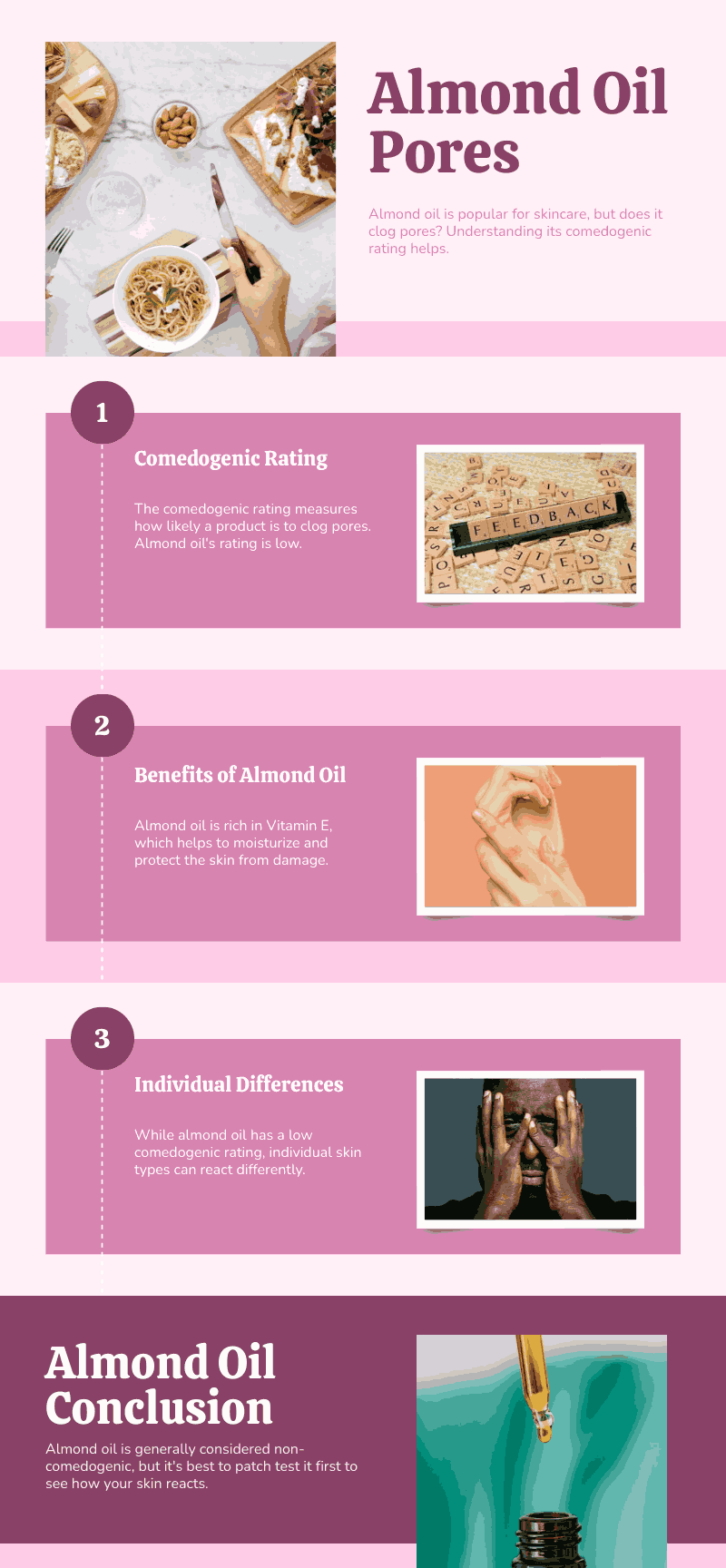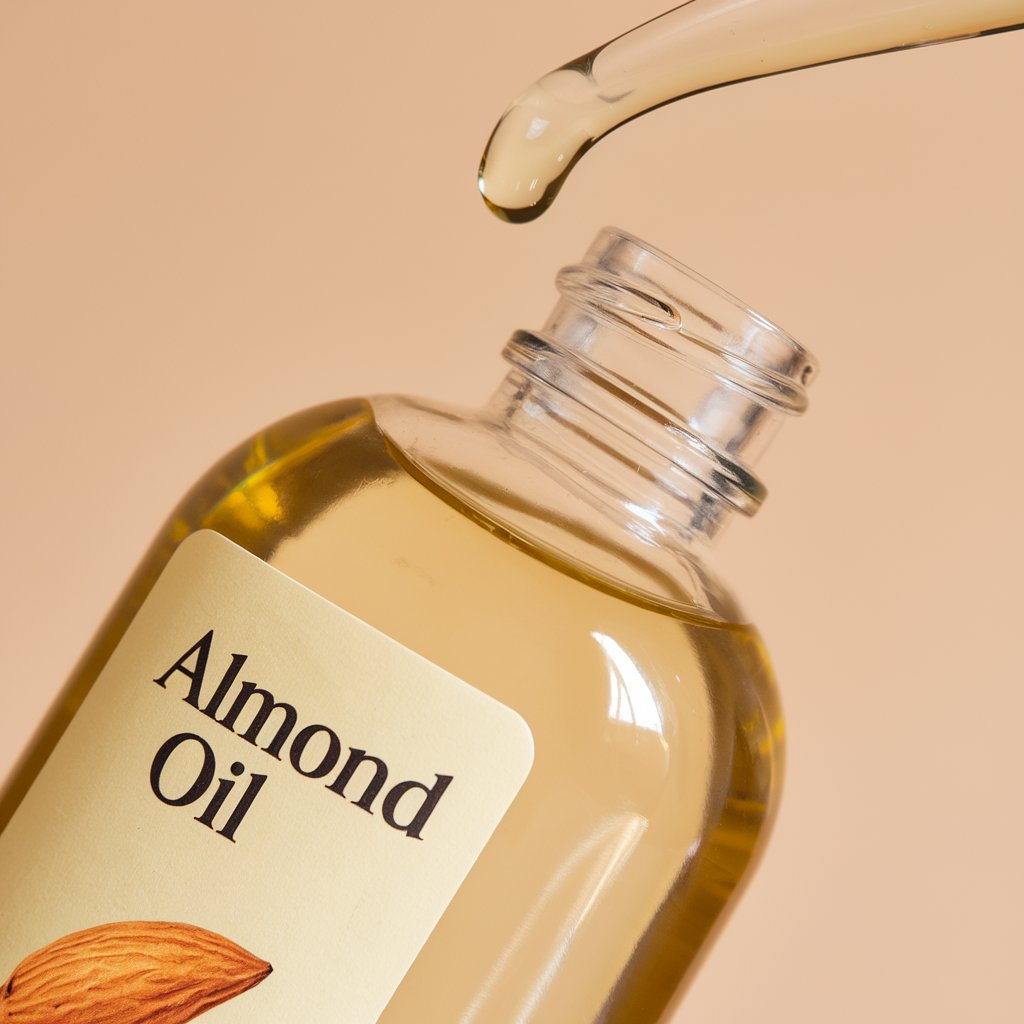- Almond oil has a comedogenic rating of 2, meaning it’s moderately likely to clog pores.
- The oil is best suited for dry and normal skin, offering deep hydration without a greasy feel.
- Those with oily or acne-prone skin should approach almond oil for acne with caution due to its pore-clogging potential.
- Dermatologists recommend almond oil for dry skin but warn that it could cause breakouts for oily skin types.
Have you ever wondered if the natural oils you’re using might be doing more harm than good? Almond oil has moisturizing properties, but the real question is—Is almond oil comedogenic? Does it clog pores and cause breakouts?
You’re not alone in feeling confused about the safety of almond oil. It’s often marketed as a gentle, nourishing oil, but skincare enthusiasts and dermatologists alike have raised concerns. Is almond oil truly as safe as it seems, or could it be leading to those frustrating breakouts?
Understanding Almond Oil’s Comedogenicity
To understand whether almond oil will clog your pores, we should first get familiar with the comedogenicity of almond oil. This scale ranks skincare ingredients based on their likelihood of causing comedones, also known as clogged pores. It ranges from 0 (non-comedogenic) to 5 (highly comedogenic).
Almond oil has a comedogenic rating of 2, which makes it moderately comedogenic. What does that mean? In simple terms, it has the potential to clog pores, but it’s not as likely as oils with higher ratings, like coconut oil (which has a rating of 4).

What Research Says About Almond Oil
Almond oil is recognized for its emollient properties. It helps to soften and smooth the skin, which makes it a popular ingredient in moisturizers and serums. Although no direct studies confirm its non-comedogenic oils for skin status, its rating of 2 on the comedogenicity scale suggests it could be a concern for those with oily or acne-prone skin.
Clinical safety assessments have shown that sweet almond oil is generally non-irritating and non-sensitizing. The oil is unlikely to cause irritation or allergic reactions in most users. This is good news for anyone with sensitive skin. However, the same research indicates that while almond oil may not cause adverse reactions, it could still potentially clog pores in certain individuals due to its moderate almond oil comedogenic rating.
For dry or combination skin types, almond oil’s ability to lock in moisture and improve texture can be beneficial. But for those prone to acne, it might be best to approach with caution. The research points to the importance of understanding your skin type and how it reacts to oils before making almond oil a staple in your routine.
Dermatologists’ Opinions: Is Almond Oil Safe?
Dermatologists often have a split perspective when it comes to using almond oil acne for skincare. While the oil has numerous benefits, its moderate comedogenicity rating means it’s not a one-size-fits-all solution.
Dr. Shereene Idriss, a board-certified dermatologist, reassures that:
“Almond oil is considered non-comedogenic, meaning it won’t clog your pores.” Her statement reflects that almond oil can be safe and beneficial for most skin types, especially for those who don’t typically suffer from breakouts. According to her, the oil’s ability to lock in moisture without leading to congestion makes it an attractive option for many skincare enthusiasts.
However, Dr. Joshua Zeichner, another respected dermatologist, takes a more cautious approach. He says:
“Sweet almond oil is a great moisturizer for dry skin types, but I would recommend caution for those with oily or acne-prone skin due to its moderate comedogenicity rating.” His advice is a reminder that while almond oil works well for dry skin, it’s not always the best choice for everyone—especially if you’re prone to acne.
Both dermatologists highlight almond oil’s excellent hydrating properties. However, they also agree that the oil may not be ideal for oily skin types.
What Real Users Have Experienced
While research provides valuable insight, nothing quite compares to hearing from real users who’ve tried almond oil on their skin. As with many skincare products, experiences vary depending on skin type and how the oil is used.
On the SkinKraft Blog, one user said,
“Almond oil is an excellent moisturizer for people with dry skin. This oil has a comedogenic rating of 2, so it works for me but might not suit everyone.” This sentiment is echoed across various forums, where users with dry or sensitive skin often report smoother, more hydrated skin without experiencing clogged pores.
However, for those with oily or acne-prone skin, the feedback is mixed. A commenter on Reddit’s Skincare Community shared,
“I loved how moisturizing almond oil was, but I started breaking out after a few days of using it.” This experience is not uncommon. Users who are prone to acne or have oily skin report that almond oil sometimes leaves their skin feeling greasy or leads to breakouts, aligning with its moderate comedogenic rating of 2.
Beauty vloggers on YouTube have also shared similar stories. One vlogger mentioned,
“I found almond oil to be super hydrating, but I had to stop using it because it made my skin feel greasy and led to breakouts.” You may, therefore, need to understand your skin type before using almond oil.
In contrast, on Typology, users are more cautious. One user noted,
“Sweet almond oil should be used with caution on skin prone to blemishes,” reflecting the same advice offered by dermatologists.
Who Should Use Almond Oil, and Who Shouldn’t?
Almond oil can be a wonderful addition to your skincare routine, but only if it suits your skin type. Understanding whether it’s right for you is crucial to avoiding unwanted breakouts or irritation.
Who Should Use Almond Oil?
If you have dry or sensitive skin, almond oil might be your best friend. Its emollient properties help lock in moisture, leaving your skin soft and hydrated without a greasy feel. People with dry skin often struggle to find products that provide long-lasting hydration, and almond oil’s natural composition makes it gentle enough for everyday use. Clinical assessments even show that it’s non-irritating and non-sensitizing for most people, meaning it’s unlikely to trigger allergic reactions.
Additionally, if your skin is normal (neither too oily nor too dry), almond oil can help maintain balance and improve texture. It smooths the skin and improves overall skin tone, making it a popular choice in many skincare products designed for hydration and nourishment.
Who Should Avoid Almond Oil?
On the other hand, if you have oily or acne-prone skin, you might want to think twice before incorporating almond oil into your routine. Its moderate comedogenicity rating of 2 means it has the potential to clog pores, especially if your skin is already prone to excess oil production or blemishes. Oils for acne-prone skin need to be chosen carefully.
That doesn’t mean you can never use almond oil if you have oily or acne-prone skin, but it does mean you should be cautious. Patch testing is key—try it on a small area of your skin before applying it all over your face. If you notice any signs of clogged pores or new breakouts, it might be time to consider other alternatives better suited for your skin type.
Other Natural Alternatives to Almond Oil
If almond oil doesn’t seem like the right fit for your skin, don’t worry. There are plenty of other natural oils that offer similar benefits without the risk of clogging pores. These oils that don’t clog pores can provide moisture and nourishment, especially for those with oily or acne-prone skin.
Jojoba Oil
Jojoba oil is a popular option for people with oily or acne-prone skin because it closely resembles the skin’s natural sebum. With a comedogenic rating of 2, it is generally safe for most skin types and helps balance oil production. Jojoba oil is lightweight, absorbs quickly, and won’t leave your skin feeling greasy, making it a versatile choice for many skincare routines.
Grapeseed Oil
Grapeseed oil has a comedogenic rating of 1, meaning it is less likely to clog pores than almond oil. This oil is rich in antioxidants and linoleic acid, which helps soothe inflammation and improve acne-prone skin. It’s lightweight and absorbs easily, making it a great option for oily skin types that need moisture without the risk of breakouts.
Rosehip Oil
With a comedogenic rating of 1, rosehip oil is another excellent alternative for acne-prone skin. It’s rich in essential fatty acids and vitamin A, which help repair damaged skin, improve skin tone, and reduce the appearance of acne scars. Rosehip oil is particularly beneficial for those dealing with hyperpigmentation or uneven skin texture, as it promotes cell regeneration without clogging pores.
Hemp Seed Oil
Hemp seed oil is one of the most non-comedogenic oils available, with a comedogenic rating of 0. It’s lightweight and won’t block pores, making it ideal for oily or acne-prone skin.
Argan Oil
Argan oil has a comedogenic rating of 0, making it an excellent choice for all skin types, including oily and acne-prone skin. The oil is also known for its anti-inflammatory properties, which can help reduce redness and irritation, making it a good option for sensitive skin as well.
The verdict: can almond oil clog pores?
Almond oil has emollient properties that can soften and moisturize the skin, making it effective for tackling dryness without leaving a greasy residue. However, its moderate comedogenic rating of 2 means that it’s not the best option for everyone. This is particularly true if you have oily or acne-prone skin.
Research shows that almond oil is generally safe, non-irritating, and beneficial for most users. Dermatologists like Dr. Joshua Zeichner caution that it could lead to clogged pores and breakouts for those already prone to blemishes.
While some users proved that almond oil is hydrating, others have found that it causes breakouts, especially when used on oily skin.
Ultimately, whether almond oil is right for you depends on your skin type. If you have dry or normal skin, it can be a great addition to your skincare routine. However, if your skin tends to be oily or acne-prone, you may want to consider alternatives like jojoba oil or grapeseed oil, which are less likely to clog pores.

I’m a devoted organic skincare enthusiast, passionate about the natural, wholesome goodness that organic products bring to our skin.
Organic skincare isn’t just a hobby for me—it’s a lifestyle. Every product I use, recommend, and write about has been carefully chosen for its purity and effectiveness. Everything I write about is backed by scientific studies, dermatologists’ opinions, and user experiences.
I also excel at tackling skincare challenges with innovative, organic solutions.


